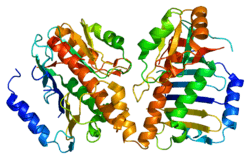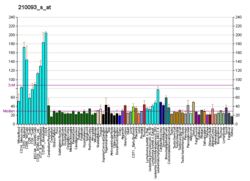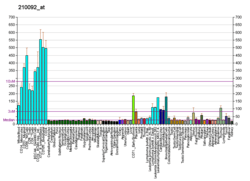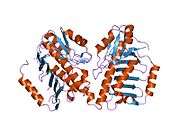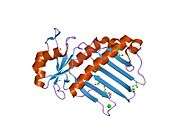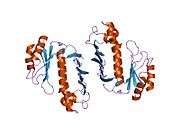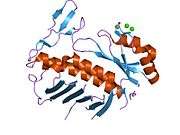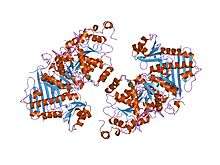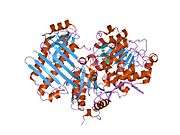MAGOH
Protein mago nashi homolog is a protein that in humans is encoded by the MAGOH gene.[5][6]
Drosophila that have mutations in their mago nashi (grandchildless) gene produce progeny with defects in germplasm assembly and germline development. This gene encodes the mammalian mago nashi homolog. In mammals, mRNA expression is not limited to the germ plasm, but is expressed ubiquitously in adult tissues and can be induced by serum stimulation of quiescent fibroblasts.[6]
Interactions
MAGOH has been shown to interact with RBM8A[7][8] and NXF1.[8] In Drosophila melanogaster, Mago Nashi and Tsunagi/Y14 (core components of the exon junction complex) form a complex with a novel zinc finger protein, Ranshi, that has a role in oocyte differentiation.[9]
gollark: Or rust or even D.
gollark: Python is not good if speed is necessary. Also premature optimisation yes.
gollark: ddg! Turing machine free download
gollark: Idea: choicescript option for <@709333181983096834>.
gollark: ChoiceScript?
References
- GRCh38: Ensembl release 89: ENSG00000162385 - Ensembl, May 2017
- GRCm38: Ensembl release 89: ENSMUSG00000028609 - Ensembl, May 2017
- "Human PubMed Reference:". National Center for Biotechnology Information, U.S. National Library of Medicine.
- "Mouse PubMed Reference:". National Center for Biotechnology Information, U.S. National Library of Medicine.
- Zhao XF, Colaizzo-Anas T, Nowak NJ, Shows TB, Elliott RW, Aplan PD (April 1998). "The mammalian homologue of mago nashi encodes a serum-inducible protein". Genomics. 47 (2): 319–22. doi:10.1006/geno.1997.5126. PMID 9479507.
- "Entrez Gene: MAGOH mago-nashi homolog, proliferation-associated (Drosophila)".
- Zhao, X F; Nowak N J; Shows T B; Aplan P D (January 2000). "MAGOH interacts with a novel RNA-binding protein". Genomics. UNITED STATES. 63 (1): 145–8. doi:10.1006/geno.1999.6064. ISSN 0888-7543. PMID 10662555.
- Kataoka, N; Diem M D; Kim V N; Yong J; Dreyfuss G (November 2001). "Magoh, a human homolog of Drosophila mago nashi protein, is a component of the splicing-dependent exon-exon junction complex". EMBO J. England. 20 (22): 6424–33. doi:10.1093/emboj/20.22.6424. ISSN 0261-4189. PMC 125744. PMID 11707413.
- Lewandowski JP, Sheehan KB, Bennett PE Jr, Boswell RE (Mar 2010). "Mago Nashi, Tsunagi/Y14, and Ranshi form a complex that influences oocyte differentiation in Drosophila melanogaster". Dev. Biol. 339 (2): 307–19. doi:10.1016/j.ydbio.2009.12.035. PMC 2852135. PMID 20045686.
Further reading
- Newmark PA, Mohr SE, Gong L, Boswell RE (1997). "mago nashi mediates the posterior follicle cell-to-oocyte signal to organize axis formation in Drosophila". Development. 124 (16): 3197–207. PMID 9272960.
- Zhao XF, Nowak NJ, Shows TB, Aplan PD (2000). "MAGOH interacts with a novel RNA-binding protein". Genomics. 63 (1): 145–8. doi:10.1006/geno.1999.6064. PMID 10662555.
- Zhang QH, Ye M, Wu XY, et al. (2001). "Cloning and functional analysis of cDNAs with open reading frames for 300 previously undefined genes expressed in CD34+ hematopoietic stem/progenitor cells". Genome Res. 10 (10): 1546–60. doi:10.1101/gr.140200. PMC 310934. PMID 11042152.
- Mingot JM, Kostka S, Kraft R, et al. (2001). "Importin 13: a novel mediator of nuclear import and export". EMBO J. 20 (14): 3685–94. doi:10.1093/emboj/20.14.3685. PMC 125545. PMID 11447110.
- Hachet O, Ephrussi A (2002). "Drosophila Y14 shuttles to the posterior of the oocyte and is required for oskar mRNA transport". Curr. Biol. 11 (21): 1666–74. doi:10.1016/S0960-9822(01)00508-5. PMID 11696323.
- Kataoka N, Diem MD, Kim VN, et al. (2002). "Magoh, a human homolog of Drosophila mago nashi protein, is a component of the splicing-dependent exon-exon junction complex". EMBO J. 20 (22): 6424–33. doi:10.1093/emboj/20.22.6424. PMC 125744. PMID 11707413.
- Jurica MS, Licklider LJ, Gygi SR, et al. (2002). "Purification and characterization of native spliceosomes suitable for three-dimensional structural analysis". RNA. 8 (4): 426–39. doi:10.1017/S1355838202021088. PMC 1370266. PMID 11991638.
- Strausberg RL, Feingold EA, Grouse LH, et al. (2003). "Generation and initial analysis of more than 15,000 full-length human and mouse cDNA sequences". Proc. Natl. Acad. Sci. U.S.A. 99 (26): 16899–903. Bibcode:2002PNAS...9916899M. doi:10.1073/pnas.242603899. PMC 139241. PMID 12477932.
- Fribourg S, Gatfield D, Izaurralde E, Conti E (2003). "A novel mode of RBD-protein recognition in the Y14-Mago complex". Nat. Struct. Biol. 10 (6): 433–9. doi:10.1038/nsb926. PMID 12730685.
- Lau CK, Diem MD, Dreyfuss G, Van Duyne GD (2004). "Structure of the Y14-Magoh core of the exon junction complex". Curr. Biol. 13 (11): 933–41. doi:10.1016/S0960-9822(03)00328-2. PMID 12781131.
- Chan CC, Dostie J, Diem MD, et al. (2004). "eIF4A3 is a novel component of the exon junction complex". RNA. 10 (2): 200–9. doi:10.1261/rna.5230104. PMC 1370532. PMID 14730019.
- Palacios IM, Gatfield D, St Johnston D, Izaurralde E (2004). "An eIF4AIII-containing complex required for mRNA localization and nonsense-mediated mRNA decay". Nature. 427 (6976): 753–7. Bibcode:2004Natur.427..753P. doi:10.1038/nature02351. PMID 14973490.
- Jin J, Smith FD, Stark C, et al. (2004). "Proteomic, functional, and domain-based analysis of in vivo 14-3-3 binding proteins involved in cytoskeletal regulation and cellular organization". Curr. Biol. 14 (16): 1436–50. doi:10.1016/j.cub.2004.07.051. PMID 15324660.
- Gerhard DS, Wagner L, Feingold EA, et al. (2004). "The status, quality, and expansion of the NIH full-length cDNA project: the Mammalian Gene Collection (MGC)". Genome Res. 14 (10B): 2121–7. doi:10.1101/gr.2596504. PMC 528928. PMID 15489334.
- Ballut L, Marchadier B, Baguet A, et al. (2005). "The exon junction core complex is locked onto RNA by inhibition of eIF4AIII ATPase activity". Nat. Struct. Mol. Biol. 12 (10): 861–9. doi:10.1038/nsmb990. PMID 16170325.
- Gehring NH, Kunz JB, Neu-Yilik G, et al. (2005). "Exon-junction complex components specify distinct routes of nonsense-mediated mRNA decay with differential cofactor requirements". Mol. Cell. 20 (1): 65–75. doi:10.1016/j.molcel.2005.08.012. PMID 16209946.
- Gregory SG, Barlow KF, McLay KE, et al. (2006). "The DNA sequence and biological annotation of human chromosome 1". Nature. 441 (7091): 315–21. Bibcode:2006Natur.441..315G. doi:10.1038/nature04727. PMID 16710414.
- Andersen CB, Ballut L, Johansen JS, et al. (2006). "Structure of the exon junction core complex with a trapped DEAD-box ATPase bound to RNA". Science. 313 (5795): 1968–72. Bibcode:2006Sci...313.1968A. doi:10.1126/science.1131981. PMID 16931718.
- Ewing RM, Chu P, Elisma F, et al. (2007). "Large-scale mapping of human protein-protein interactions by mass spectrometry". Mol. Syst. Biol. 3 (1): 89. doi:10.1038/msb4100134. PMC 1847948. PMID 17353931.
- Quaresma AJ, Sievert R, Nickerson JA (2013). "Regulation of mRNA export by the PI3 kinase/AKT signal transduction pathway". Mol. Biol. Cell. 24 (8): 1208–21. doi:10.1091/mbc.E12-06-0450. PMC 3623641. PMID 23427269.
This article is issued from Wikipedia. The text is licensed under Creative Commons - Attribution - Sharealike. Additional terms may apply for the media files.
